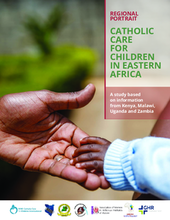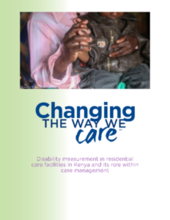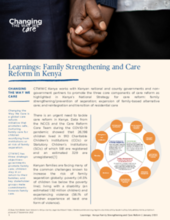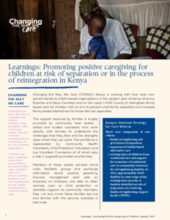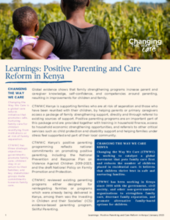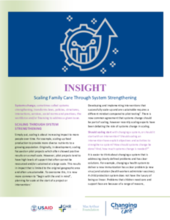This country page features an interactive, icon-based data dashboard providing a national-level overview of the status of children’s care and care reform efforts (a “Country Care Snapshot”), along with a list of resources and organizations in the country.
demographic_data
childrens_living_arrangement
children_living_without_bio
adoption
social_work_force
key_stakeholders
Key Stakeholders
Add New DataOther Relevant Reforms
Add New Datadrivers_of_institutionalisation
Drivers of Institutionaliziation
Add New Datakey_research_and_information
Key Data Sources
Add New DataChildren's Act, 2022 (Kenya)
Prevalence and number of children living in institutional care: global, regional, and country estimates
Social Protection and Disability in Kenya
Kenya Social Protection Sector Review
Country Care Review: Kenya
Child Developmental Disabilities, Caregivers’ Role in Kenya and Its Implications on Global Migration
Research findings on Alternative care system in Kenya for children without parental care
Charitable Children Institutions in Kenya: Factors Influencing Institutionalization of Children
Acknowledgements
Data for this country care snapshot was contributed by consultants with Maestral International.
Displaying 91 - 100 of 447
This study sought to explore the prevalence of depression among orphaned adolescents in the selected children’s homes in Githurai Division, Nairobi County.
This regional portrait describes Catholic-sponsored care for children in Eastern Africa using data from Kenya, Malawi, Uganda and Zambia. The first large study of its kind, it focuses on children who are particularly vulnerable—those at risk of or those who have been separated from their families. Many are in institutional care. This portrait also describes growing efforts, led by women and men religious, to ensure children can grow up in safe, nurturing families or family-like environments rather than institutions.
Though research has been conducted on children with disabilities and on children in residential care settings, the intersections of these two topics has yet to be explored in depth. Notably, there is a lack of information surrounding disability measurement within residential care settings, highlighting a gap in the literature. It is estimated that a child with a disability is 17 times more likely to be placed in an institutionalized care setting than a child without a disability, and girls are more likely to be placed in an institution than boys. This report details research conducted in Kenya.
A Kenyan religious cult leader accused of inciting followers to starve to death is facing additional charges including terrorism and child trafficking.
This brief summarizes the original design of Changing the Way We Care’s family strengthening approach, the lessons learned during implementation, and the adaptations that CTWWC is making to maximize the impact of its family strengthening work.
This CTWWC brief describes the family strengthening approach and the people who work with families and children. It shares reflections from facilitators of parenting sessions and the caregivers, themselves.
Positive parenting programs are an important part of this package and are provided together with training in household finance, access to household economic strengthening opportunities, and referrals to other critical services such as child protection and disability support and helping families under stress feel supported and part of their local community. This brief describes the program and interventions.
This Changing the Way We Care Insights Learning Brief describes how systems strengthening alone can lead to scaling of interventions, including interventions that already exist.
Families Together is a parenting curriculum for families who have a child reintegrating into the home. The program is an adapted version of the Skillful Parenting Programme, designed and delivered in Kenya by Investing in Children and their Societies (ICS).


